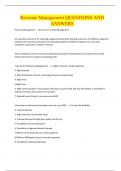CRME Certified Revenue Management Executive Study guides, Class notes & Summaries
Looking for the best study guides, study notes and summaries about CRME Certified Revenue Management Executive? On this page you'll find 113 study documents about CRME Certified Revenue Management Executive.
Page 2 out of 113 results
Sort by
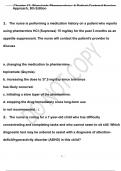
-
Chapter 17: Stimulants Pharmacology: A Patient-Centered Nursing Process
- Exam (elaborations) • 6 pages • 2024
-
- $6.39
- + learn more
1. The nurse is performing a medication history on a patient who reports using phentermine HCl (Suprenza) 15 mg/day for the past 3 months as an appetite suppressant. The nurse will contact the patient's provider to discuss a. changing the medication to phentermine-topiramate (Qsymia). b. increasing the dose to 37.5 mg/day since tolerance has likely occurred. c. initiating a slow taper of the phentermine. d. stopping the drug immediately since long-term use is not recommended.: c
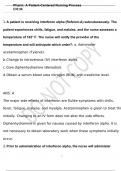
-
Pharm: A Patient-Centered Nursing Process CH:34
- Exam (elaborations) • 11 pages • 2024
-
- $5.49
- + learn more
1. A patient is receiving interferon alpha (Roferon-A) subcutaneously. The patient experiences chills, fatigue, and malaise, and the nurse assesses a temperature of 102° F. The nurse will notify the provider of the temperature and will anticipate which order?: a. Administer acetaminophen (Tylenol). b. Change to intravenous (IV) interferon alpha. c. Give diphenhydramine (Benadryl). d. Obtain a serum blood urea nitrogen (BUN) and creatinine level. ANS: A
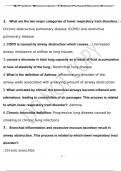
-
McCuistion: Pharmacology: A Patient-Centered Nursing Process Approac
- Exam (elaborations) • 11 pages • 2024
-
- $5.49
- + learn more
1. What are the two major categories of lower respiratory tract disorders.: - Chronic obstructive pulmonary disease (COPD) and restrictive pulmonary disease 2. COPD is caused by airway obstruction which causes....: increased airway resistance of airflow to lung tissues. 3. causes a decrease in total lung capacity as a result of fluid accumulation or loss of elasticity of the lung.: Restrictive lung disease
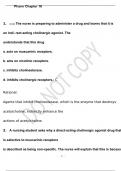
-
Pharm Chapter 16
- Exam (elaborations) • 19 pages • 2024
-
- $6.39
- + learn more
1. nurse The nurse is preparing to administer a drug and learns that it is an indi- rect-acting cholinergic agonist. The understands that this drug a. acts on muscarinic receptors. b. acts on nicotinic receptors. c. inhibits cholinesterase. d. inhibits cholinergic receptors.: C Rational: Agents that inhibit cholinesterase, which is the enzyme that destroys acetylcholine, indirectly enhance the actions of acetylcholine.
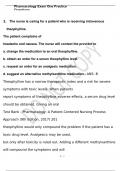
-
Pharmacology Exam One Practice Questions
- Exam (elaborations) • 36 pages • 2024
-
- $4.49
- + learn more
1. The nurse is caring for a patient who is receiving intravenous theophylline. The patient complains of headache and nausea. The nurse will contact the provider to a. change the medication to an oral theophylline. b. obtain an order for a serum theophylline level. c. request an order for an analgesic medication. d. suggest an alternative methylxanthine medication.: ANS: B Theophylline has a narrow therapeutic index and a risk for severe symptoms with toxic levels. When patients report s...
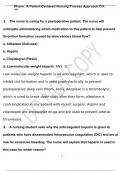
-
Pharm: A Patient-Centered Nursing Process Approach CH: 40
- Exam (elaborations) • 17 pages • 2024
-
- $5.49
- + learn more
1. The nurse is caring for a postoperative patient. The nurse will anticipate administering which medication to this patient to help prevent thrombus formation caused by slow venous blood flow? a. Alteplase (Activase) b. Aspirin c. Clopidogrel (Plavix) d. Low-molecular-weight heparin: ANS: D Low-molecular-weight heparin is an anticoagulant, which is used to inhibit clot formation and is used prophylactically to prevent postoperative deep vein throm- bosis. Alteplase is a thrombolytic, which...
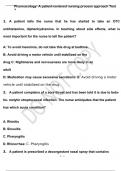
-
Pharmacology- A patient-centered nursing process approach Test 3
- Exam (elaborations) • 41 pages • 2024
-
- $5.59
- + learn more
1. A patient tells the nurse that he has started to take an OTC antihistamine, diphenhydramine. In teaching about side effects, what is most important for the nurse to tell the patient? A: To avoid insominia, do not take this drug at bedtime. B: Avoid driving a motor vehicle until stabilized on the drug C: Nightmares and nervousness are more likely in an adult D: Medication may cause excessive secretions: B: Avoid driving a motor vehicle until stabilized on the drug 2. A patient complains of...
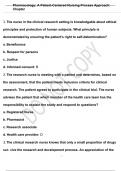
-
Pharmacology: A Patient-Centered Nursing Process Approach: Chapter
- Exam (elaborations) • 7 pages • 2024
-
- $4.49
- + learn more
1. The nurse in the clinical research setting is knowledgable about ethical principles and protection of human subjects. What principle is demonstrated by ensuring the patient's right to self-determination? a. Beneficence b. Respect for persons c. Justice d. Informed consent: B 2. The research nurse is meeting with a patient and determines, based on the assessment, that the patient meets inclusion criteria for clinical research. The patient agrees to participate in the clinical trial. The ...
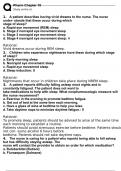
-
Pharm Chapter 18
- Exam (elaborations) • 10 pages • 2024
-
- $5.39
- + learn more
1. A patient describes having vivid dreams to the nurse. The nurse under- stands that these occur during which stage of sleep? a. Rapid eye movement (REM) sleep b. Stage 2 nonrapid eye movement sleep c. Stage 3 nonrapid eye movement sleep d. Stage 4 nonrapid eye movement sleep: A Rational: Vivid dreams occur during REM sleep. 2. Children who experience nightmares have these during which stage of sleep? a. Early morning sleep b. Nonrapid eye movement sleep c. Rapid eye movement sleep ...
Revenue Management QUESTIONS AND ANSWER

Do you wonder why so many students wear nice clothes, have money to spare and enjoy tons of free time? Well, they sell on Stuvia! Imagine your study notes being downloaded a dozen times for $15 each. Every. Single. Day. Discover all about earning on Stuvia



